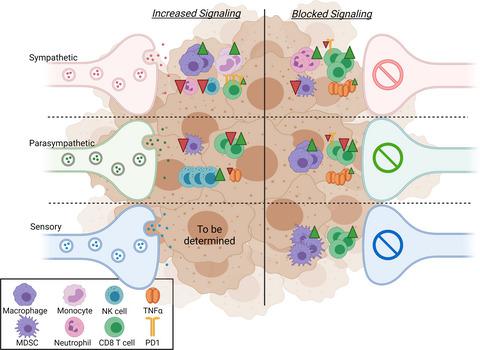当前位置:
X-MOL 学术
›
Immunol. Cell Biol.
›
论文详情
Our official English website, www.x-mol.net, welcomes your
feedback! (Note: you will need to create a separate account there.)
Neuroimmunology of cancer and associated symptomology
Immunology and Cell Biology ( IF 3.2 ) Pub Date : 2021-08-05 , DOI: 10.1111/imcb.12496 Nicole N Scheff 1 , Jami L Saloman 1
Immunology and Cell Biology ( IF 3.2 ) Pub Date : 2021-08-05 , DOI: 10.1111/imcb.12496 Nicole N Scheff 1 , Jami L Saloman 1
Affiliation

|
Evolutionarily, the nervous system and immune cells have evolved to communicate with each other to control inflammation and host responses against injury. Recent findings in neuroimmune communication demonstrate that these mechanisms extend to cancer initiation and progression. Lymphoid structures and tumors, which are often associated with inflammatory infiltrate, are highly innervated by multiple nerve types (e.g. sympathetic, parasympathetic, sensory). Recent preclinical and clinical studies demonstrate that targeting the nervous system could be a therapeutic strategy to promote antitumor immunity while simultaneously reducing cancer-associated neurological symptoms, such as chronic pain, fatigue and cognitive impairment. Sympathetic nerve activity is associated with physiological or psychological stress, which can be induced by tumor development and cancer diagnosis. Targeting the stress response through suppression of sympathetic activity or activation of parasympathetic activity has been shown to drive activation of effector T cells and inhibition of myeloid-derived suppressor cells within the tumor. In addition, there is emerging evidence that sensory nerves may regulate tumor growth and metastasis by promoting or inhibiting immunosuppression in a tumor-type specific manner. Because neural effects are often tumor-type specific, further study is required to optimize clinical therapeutic strategies. This review examines the emerging evidence that neuroimmune communication can regulate antitumor immunity as well as contribute to development of cancer-related neurological symptoms.
中文翻译:

癌症和相关症状的神经免疫学
从进化上讲,神经系统和免疫细胞已经进化到可以相互交流以控制炎症和宿主对损伤的反应。神经免疫通讯的最新发现表明,这些机制扩展到癌症的发生和进展。淋巴结构和肿瘤通常与炎症浸润有关,受多种神经类型(例如交感神经、副交感神经、感觉神经)的高度支配。最近的临床前和临床研究表明,靶向神经系统可能是一种促进抗肿瘤免疫的治疗策略,同时减少癌症相关的神经系统症状,如慢性疼痛、疲劳和认知障碍。交感神经活动与生理或心理压力有关,这可以由肿瘤发展和癌症诊断诱导。通过抑制交感神经活动或激活副交感神经活动来靶向应激反应已被证明可以驱动效应 T 细胞的激活和肿瘤内髓源性抑制细胞的抑制。此外,有新的证据表明感觉神经可能通过以肿瘤类型特异性方式促进或抑制免疫抑制来调节肿瘤的生长和转移。由于神经效应通常具有肿瘤类型特异性,因此需要进一步研究以优化临床治疗策略。本综述审查了新出现的证据,即神经免疫通讯可以调节抗肿瘤免疫以及促进癌症相关神经系统症状的发展。通过抑制交感神经活动或激活副交感神经活动来靶向应激反应已被证明可以驱动效应 T 细胞的激活和肿瘤内髓源性抑制细胞的抑制。此外,有新的证据表明感觉神经可能通过以肿瘤类型特异性方式促进或抑制免疫抑制来调节肿瘤的生长和转移。由于神经效应通常具有肿瘤类型特异性,因此需要进一步研究以优化临床治疗策略。本综述审查了新出现的证据,即神经免疫通讯可以调节抗肿瘤免疫以及促进癌症相关神经系统症状的发展。通过抑制交感神经活动或激活副交感神经活动来靶向应激反应已被证明可以驱动效应 T 细胞的激活和肿瘤内髓源性抑制细胞的抑制。此外,有新的证据表明感觉神经可能通过以肿瘤类型特异性方式促进或抑制免疫抑制来调节肿瘤的生长和转移。由于神经效应通常具有肿瘤类型特异性,因此需要进一步研究以优化临床治疗策略。本综述审查了新出现的证据,即神经免疫通讯可以调节抗肿瘤免疫以及促进癌症相关神经系统症状的发展。
更新日期:2021-10-04
中文翻译:

癌症和相关症状的神经免疫学
从进化上讲,神经系统和免疫细胞已经进化到可以相互交流以控制炎症和宿主对损伤的反应。神经免疫通讯的最新发现表明,这些机制扩展到癌症的发生和进展。淋巴结构和肿瘤通常与炎症浸润有关,受多种神经类型(例如交感神经、副交感神经、感觉神经)的高度支配。最近的临床前和临床研究表明,靶向神经系统可能是一种促进抗肿瘤免疫的治疗策略,同时减少癌症相关的神经系统症状,如慢性疼痛、疲劳和认知障碍。交感神经活动与生理或心理压力有关,这可以由肿瘤发展和癌症诊断诱导。通过抑制交感神经活动或激活副交感神经活动来靶向应激反应已被证明可以驱动效应 T 细胞的激活和肿瘤内髓源性抑制细胞的抑制。此外,有新的证据表明感觉神经可能通过以肿瘤类型特异性方式促进或抑制免疫抑制来调节肿瘤的生长和转移。由于神经效应通常具有肿瘤类型特异性,因此需要进一步研究以优化临床治疗策略。本综述审查了新出现的证据,即神经免疫通讯可以调节抗肿瘤免疫以及促进癌症相关神经系统症状的发展。通过抑制交感神经活动或激活副交感神经活动来靶向应激反应已被证明可以驱动效应 T 细胞的激活和肿瘤内髓源性抑制细胞的抑制。此外,有新的证据表明感觉神经可能通过以肿瘤类型特异性方式促进或抑制免疫抑制来调节肿瘤的生长和转移。由于神经效应通常具有肿瘤类型特异性,因此需要进一步研究以优化临床治疗策略。本综述审查了新出现的证据,即神经免疫通讯可以调节抗肿瘤免疫以及促进癌症相关神经系统症状的发展。通过抑制交感神经活动或激活副交感神经活动来靶向应激反应已被证明可以驱动效应 T 细胞的激活和肿瘤内髓源性抑制细胞的抑制。此外,有新的证据表明感觉神经可能通过以肿瘤类型特异性方式促进或抑制免疫抑制来调节肿瘤的生长和转移。由于神经效应通常具有肿瘤类型特异性,因此需要进一步研究以优化临床治疗策略。本综述审查了新出现的证据,即神经免疫通讯可以调节抗肿瘤免疫以及促进癌症相关神经系统症状的发展。











































 京公网安备 11010802027423号
京公网安备 11010802027423号